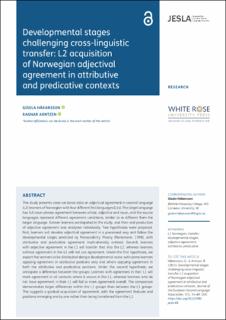Developmental stages challenging cross-linguistic transfer: L2 acquisition of Norwegian adjectival agreement in attributive and predicative contexts
Peer reviewed, Journal article
Published version
Permanent lenke
https://hdl.handle.net/11250/2826333Utgivelsesdato
2021Metadata
Vis full innførselSamlinger
Originalversjon
Journal of the European Second Language Association. 2021, 5 (1), 54-69. 10.22599/jesla.68Sammendrag
This study presents cross-sectional data on adjectival agreement in second-language (L2) learners of Norwegian with four different first languages (L1s). The target language has full noun phrase agreement between article, adjective and noun, and the source languages represent different agreement conditions, similar to or different from the target language. Sixteen learners participated in the study, and their oral production of adjective agreement was analysed individually. Two hypotheses were proposed. First, learners will develop adjectival agreement in a piecemeal way and follow the developmental stages predicted by Processability Theory (Pienemann, 1998), with attributive and predicative agreement implicationally ordered. Second, learners with adjective agreement in the L1 will transfer that into the L2, whereas learners without agreement in the L1 will not use agreement. Under the first hypothesis, we expect the learners to be distributed along a developmental scale, with some learners applying agreement in attributive positions only and others applying agreement in both the attributive and predicative positions. Under the second hypothesis, we anticipate a difference between the groups: Learners with agreement in their L1 will mark agreement in all contexts where it occurs in the L1, whereas learners who do not have agreement in their L1 will fail to mark agreement overall. The comparison demonstrates larger differences within the L1 groups than between the L1 groups. This suggests a gradual acquisition of agreement, with the agreement features and positions emerging one by one rather than being transferred from the L1.

